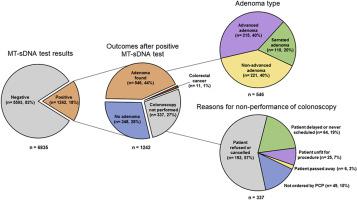Gastrointestinal Endoscopy ( IF 6.7 ) Pub Date : 2020-01-02 , DOI: 10.1016/j.gie.2019.12.027 Nimish Vakil 1 , Kristin Ciezki 2 , Nadia Huq 2 , Maharaj Singh 3

|
Background and Aims
Multitarget stool DNA (MT-sDNA) testing is used in primary care as a screening test for colon cancer. Test effectiveness and patient compliance were examined in clinical practice.
Methods
We assessed outcomes of MT-sDNA testing in a cohort study conducted in a large integrated healthcare system comprising 15 hospitals and 150 outpatient clinics using advanced electronic data capture (Clarity2 [Epic, Verona, Wisc, USA] and REDCap [Encinitas, Calif, USA]) followed by manual chart review to confirm MT-sDNA test results and to monitor the outcomes of subsequent colonoscopy.
Results
A total of 6835 MT-sDNA tests were performed over 1 year between 2017 and 2018. Of 1242 patients (18%) who tested positive, 1109 (89%) were referred for colonoscopy, and 905 of them (73%) underwent colonoscopy. Eleven patients (<1%) with a positive test had colorectal cancer, 215 (17%) had advanced adenomas, 110 (9%) had serrated adenomas, and 546 (60%) patients had an adenoma. Of the 6835 patients tested, adenoma or cancer was found in 557 patients (8%). An advanced adenoma or cancer was found in 226 of 1242 patients with a positive test (18%). Nonadherence with colonoscopy after a positive test was high (21%), and the cost to detect 1 advanced adenoma or cancer was $38,849.
Conclusions
The frequency of adenoma detection by an MT-sDNA screening strategy is low, and many positive tests are not associated with significant findings at colonoscopy. Failure to follow a positive test with colonoscopy is a significant problem that needs to be considered when this screening strategy is adopted.
中文翻译:

用于预防结肠癌的多靶标粪便DNA测试:大型综合医疗系统的结果。
背景和目标
多目标粪便DNA(MT-sDNA)测试在初级保健中用作结肠癌的筛查测试。在临床实践中检查了测试的有效性和患者的依从性。
方法
我们在一项由大型综合医疗系统组成的队列研究中评估了MT-sDNA测试的结果,该系统包括15家医院和150家门诊诊所,使用先进的电子数据捕获功能(Clarity2 [Epic,Verona,Wisc,USA]和REDCap [Encinitas,Calif,USA] ]),然后进行手动图表审查,以确认MT-sDNA测试结果并监视后续结肠镜检查的结果。
结果
在2017年至2018年之间的1年中,总共进行了6835例MT-sDNA检测。在检测出阳性的1242例患者(18%)中,有1109例(89%)接受了结肠镜检查,其中905例(73%)接受了结肠镜检查。测试阳性的11例患者(<1%)有结直肠癌,晚期腺瘤为215(17%),锯齿状腺瘤为110(9%),腺瘤为546(60%)。在接受测试的6835名患者中,有557名患者(占8%)被发现有腺瘤或癌症。在1242名患者中的226名患者中发现了晚期腺瘤或癌症,其检测结果为阳性(18%)。阳性检查后结肠镜检查的不依从性很高(21%),检测到1例晚期腺瘤或癌症的费用为38,849美元。
结论
通过MT-sDNA筛选策略检测腺瘤的频率很低,而且许多阳性试验与结肠镜检查的重大发现无关。如果采用这种筛查策略,则无法通过结肠镜检查进行阳性检测是一个重要的问题。











































 京公网安备 11010802027423号
京公网安备 11010802027423号